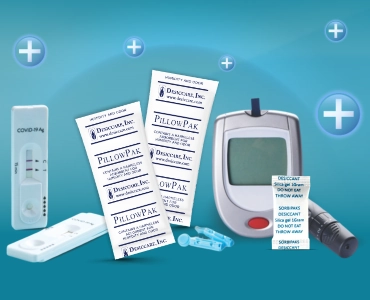Desiccants used in several types of applications
Frequently Asked Questions ?
Pharmaceutical desiccants are commonly used in the packaging of a wide range of pharmaceutical products, including tablets, capsules, powders, and other solid or semi-solid formulations. They are also used in medical device packaging and other applications where moisture control is critical.
Moisture can cause degradation, spoilage, or loss of potency in many types of pharmaceutical products, particularly those that are hygroscopic or sensitive to moisture. Pharmaceutical desiccants help maintain these products' quality and shelf-life by removing excess moisture from the packaging.
The amount of desiccant needed depends on various factors, including the type of product being packaged, the level of moisture sensitivity, and the size and type of packaging used. It is important to consult with our experts of desiccants to determine the most suitable product and amount for your specific application.
Some common types of pharmaceutical desiccants include silica gel, molecular sieve, and clay. Silica gel is often used for general moisture control, while molecular sieve is ideal for low-humidity applications. Clay is a cost-effective option for some applications.
No, when used properly, pharmaceutical desiccants do not affect the efficacy or safety of the products they protect. They are typically made from inert, non-toxic materials that do not react with the product.
Pharmaceutical desiccants can be used with various packaging materials, including plastic, glass, and metal. Therefore, ensuring that the desiccant is compatible with the other packaging materials is important and does not react with or contaminate the product.











